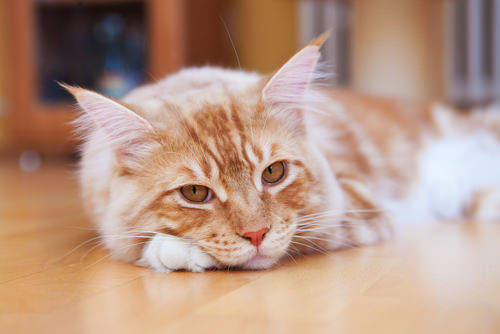
Cats can get constipated. Constipation is defined by the inability to pass normal stools. The stool itself can be hard and dry when it is passed and sometimes, cats strain and are unable to produce stool or produce very small stools. To understand constipation, you have to think about the production, formation and passage of stool and all the steps that must be working properly for this to occur.
The cat must:
- Be eating sufficient amounts of food
- Be able to swallow and digest the food
- Be able to concentrate the raw digested food into stool
- Have an open passageway for the stool to proceed through
- Have the muscle movement to push stool forward
- Be able to posture normally for the bowel to evacuate
The first step can be missing in cases suffering from anorexia. Many issues can cause cats to eat less. A cat that is not eating or is eating too little will not produce a normal amount of stool. This is not technically constipation and will resolve itself once the cat is eating normally again and the stool has time to form and pass.
Cats that cannot eat normally from dental pain (whether you can tell or not, because cats hide pain) will not produce as much stool and may seem constipated. The dental issues must be addressed by your veterinarian in order to solve this issue.
Megacolon (literally “large colon”) is a disorder that is common in adult to senior cats and is characterized by increased large bowel diameter associated with constipation and low to absent colonic motility. The lack of muscle movement allows the stool to stay too long in the colon and become large and sometimes dry. Megacolon is sometimes secondary to other more serious diseases, like cancer or inflammatory bowel disease, so a thorough examination and medical work-up are a must.
A tumor itself could be impeding the passage of stool, since constipation is more commonly seen in older cats and they are also more prone to tumors. Some cats with osteoarthritis have trouble getting into the litter box to posture and defecate.
If you notice that your cat seems to be constipated, make sure she is eating. If the issue does not resolve in a day or two or your cat has any other symptoms, let your veterinarian know about the issue. Constipation could be a sign of something more serious going on and you will need professional medical help to find out.

